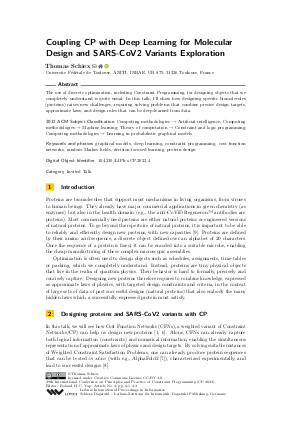Coupling CP with Deep Learning for Molecular Design and SARS-CoV2 Variants Exploration (Invited Talk)
Author
Thomas Schiex 
-
Part of:
Volume:
29th International Conference on Principles and Practice of Constraint Programming (CP 2023)
Part of: Series: Leibniz International Proceedings in Informatics (LIPIcs)
Part of: Conference: International Conference on Principles and Practice of Constraint Programming (CP) - License:
 Creative Commons Attribution 4.0 International license
Creative Commons Attribution 4.0 International license
- Publication Date: 2023-09-22
File

PDF
LIPIcs.CP.2023.4.pdf
- Filesize: 448 kB
- 3 pages
Document Identifiers
Subject Classification
ACM Subject Classification
- Computing methodologies → Artificial intelligence
- Computing methodologies → Machine learning
- Theory of computation → Constraint and logic programming
- Computing methodologies → Learning in probabilistic graphical models
Keywords
- graphical models
- deep learning
- constraint programming
- cost function networks
- random Markov fields
- decision-focused learning
- protein design
Metrics
- Access Statistics
-
Total Accesses (updated on a weekly basis)
0Document
0Metadata
Abstract
The use of discrete optimization, including Constraint Programming, for designing objects that we completely understand is quite usual. In this talk, I'll show how designing specific biomolecules (proteins) raises new challenges, requiring solving problems that combine precise design targets, approximate laws, and design rules that can be deep-learned from data.
Cite As Get BibTex
Thomas Schiex. Coupling CP with Deep Learning for Molecular Design and SARS-CoV2 Variants Exploration (Invited Talk). In 29th International Conference on Principles and Practice of Constraint Programming (CP 2023). Leibniz International Proceedings in Informatics (LIPIcs), Volume 280, pp. 4:1-4:3, Schloss Dagstuhl – Leibniz-Zentrum für Informatik (2023)
https://doi.org/10.4230/LIPIcs.CP.2023.4
BibTex
@InProceedings{schiex:LIPIcs.CP.2023.4,
author = {Schiex, Thomas},
title = {{Coupling CP with Deep Learning for Molecular Design and SARS-CoV2 Variants Exploration}},
booktitle = {29th International Conference on Principles and Practice of Constraint Programming (CP 2023)},
pages = {4:1--4:3},
series = {Leibniz International Proceedings in Informatics (LIPIcs)},
ISBN = {978-3-95977-300-3},
ISSN = {1868-8969},
year = {2023},
volume = {280},
editor = {Yap, Roland H. C.},
publisher = {Schloss Dagstuhl -- Leibniz-Zentrum f{\"u}r Informatik},
address = {Dagstuhl, Germany},
URL = {https://drops.dagstuhl.de/entities/document/10.4230/LIPIcs.CP.2023.4},
URN = {urn:nbn:de:0030-drops-190415},
doi = {10.4230/LIPIcs.CP.2023.4},
annote = {Keywords: graphical models, deep learning, constraint programming, cost function networks, random Markov fields, decision-focused learning, protein design}
}
Author Details
References
-
David Allouche, Isabelle André, Sophie Barbe, Jessica Davies, Simon de Givry, George Katsirelos, Barry O'Sullivan, Steve Prestwich, Thomas Schiex, and Seydou Traoré. Computational protein design as an optimization problem. Artificial Intelligence, 212:59-79, 2014.

-
David Allouche, Simon De Givry, George Katsirelos, Thomas Schiex, and Matthias Zytnicki. Anytime hybrid best-first search with tree decomposition for weighted CSP. In Principles and Practice of Constraint Programming: 21st International Conference, CP 2015, Cork, Ireland, August 31-September 4, 2015, Proceedings 21, pages 12-29. Springer, 2015.

-
Mireia Solà Colom, Jelena Vucinic, Jared Adolf-Bryfogle, James W Bowman, Sébastien Verel, Isabelle Moczygemba, Thomas Schiex, David Simoncini, and Christopher D Bahl. Deep evolutionary forecasting identifies highly-mutated SARS-CoV-2 variants via functional sequence-landscape enumeration. Research Square, pages rs-3, 2022.

-
M. Defresne, S. Barbe, and T. Schiex. Scalable coupling of deep learning with logical reasoning. In Proc. of the 32^nd IJCAI, Macau, A.S.R., China, 2023.

-
Valentin Durante, George Katsirelos, and Thomas Schiex. Efficient low rank convex bounds for pairwise discrete graphical models. In International Conference on Machine Learning, pages 5726-5741. PMLR, 2022.

-
Mark A Hallen and Bruce R Donald. Protein design by provable algorithms. Communications of the ACM, 62(10):76-84, 2019.

-
John Jumper, Richard Evans, Alexander Pritzel, Tim Green, Michael Figurnov, Olaf Ronneberger, Kathryn Tunyasuvunakool, Russ Bates, Augustin Žídek, Anna Potapenko, et al. Highly accurate protein structure prediction with alphafold. Nature, 596(7873):583-589, 2021.

-
Hiroki Noguchi, Christine Addy, David Simoncini, Staf Wouters, Bram Mylemans, Luc Van Meervelt, Thomas Schiex, Kam YJ Zhang, Jeremy RH Tame, and Arnout RD Voet. Computational design of symmetrical eight-bladed β-propeller proteins. IUCrJ, 6(1):46-55, 2019.

- Ilan Samish, editor. Computational Protein Design. Humana New York, NY, 2017. URL: https://doi.org/10.1007/978-1-4939-6637-0.
